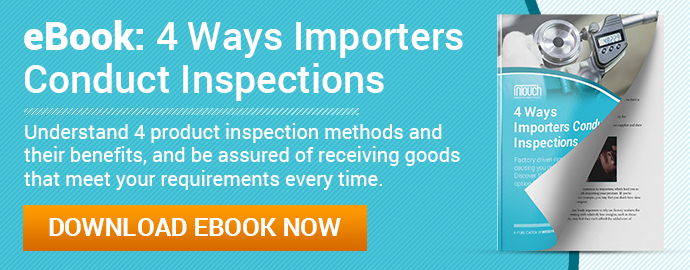 Imagine that you’re a buyer of overseas goods that has just laid the groundwork for scheduling an upcoming product inspection of your order. You have hammered out all the item specifications with your supplier, gotten a detailed production schedule from the factory and confirmed all the inspection requirements and pricing with your QC Company. Now all that’s left to do is to tell your QC guys when to go, right?
Imagine that you’re a buyer of overseas goods that has just laid the groundwork for scheduling an upcoming product inspection of your order. You have hammered out all the item specifications with your supplier, gotten a detailed production schedule from the factory and confirmed all the inspection requirements and pricing with your QC Company. Now all that’s left to do is to tell your QC guys when to go, right?
Not exactly. Booking a product inspection at one of your suppliers, particularly in China and other East Asian countries, is rarely so easy. And assuming that inspection will be booked smoothly the moment your 3rd-party QC company and supplier have been introduced is one of the most common mistakes made by buyers.
Now this is not to say you can’t have a general idea of your supplier’s production schedule. This also doesn’t mean that you, as a buyer, cannot set whatever deadlines you want. What this means is you’ll seldom be able to recognize and take into account all the factors that affect day-to-day scheduling. In this article, you’ll learn about three factors that affect scheduling a product inspection and ways you can minimize their influence.
Factor 1: Unrealistic Expectations
In the West, salespeople are often tempted to try and sell you the moon, even if they can’t deliver. If a sales representative tells you they can make 100,000 widgets in 6 weeks, it is generally a good idea to plan on needing 7-8 weeks for production. The sales rep isn’t necessarily trying to lie to you, but they have a reputation for being eternally optimistic. In China and many other countries in East Asia though, this situation is often exacerbated by language and culture.
The reason is your point of contact at an Asian supplier, unless you speak the local language, will almost always be a sales representative. This is due to the fact that the only English speakers in most Asian factories work in the sales department. What’s important for buyers like you to realize is that sales staff at a factory or vendor often have limited exposure to the actual production operations within the factory. As a result, the salesperson you’re communicating with, typically, not only wants to promise whatever they can to get you to place your order in the first place. They also may not be fully aware themselves of what and when they can actually deliver.
The solution: Make your expectations clear to the supplier upfront. One way to do this is by making sure the supplier sends you a golden sample for you to approve before you make a deposit on your order. Another recommended way is to draft a terms sheet, a list of Terms & Conditions, for your supplier. While it may be difficult to bring legal action against a supplier that doesn’t live up to the agreed upon terms, the main purpose of such a document is to clarify expectations. Such measures help to prevent order delays and quality issues, as well as set approximate dates for product inspection.
Factor 2: Saving Face
Sometimes production and shipping delays are inevitable, such as when the supplier that makes your product doesn’t receive the necessary raw materials as scheduled. Nevertheless, if a deadline is  pushed back, the supplier has broken a promise implicitly made when giving you the production schedule. The sales rep may not want anyone else to know they gave you an unrealistic timeline or the production manager may not want the sales rep to know they gave the rep an unrealistic timeline.
pushed back, the supplier has broken a promise implicitly made when giving you the production schedule. The sales rep may not want anyone else to know they gave you an unrealistic timeline or the production manager may not want the sales rep to know they gave the rep an unrealistic timeline.
Depending on what exactly went wrong, the factory as a whole may be embarrassed that they may seem unprofessional to have encountered a problem. And if you are working with a vendor, the vendor might be embarrassed that they seem to be working with a substandard factory. There could be any number of relationships at risk within the factory or between different companies where someone will not want to admit something went wrong.
For you, the worst the supplier contact could do in this situation is lie to you with the hope they can minimize the issue before it becomes apparent to you. This could manifest itself in product inspection, where the supplier has told the QC provider that "x" number of items will be ready for inspection, but inspectors arrive to find many items not ready and available. They often believe that it is better to ask forgiveness than permission, especially if they can say how they were actually able to make the best of a bad situation in the end.
The solution: Along with a terms sheet that outlines expectations and ramifications for not meeting them, ask your supplier outright for honesty upfront. We’ve seen sales reps and General Managers of factories alike try to “soften the blow” of bad news by understating shipping delays, only to have buyers tell their customers the same and then look bad later on. Let your supplier contact know early on that you want the straight truth with regard to deadlines and meeting standards. If the supplier is apprehensive about giving you a deadline, tell them you’d prefer to know what is realistic, rather than what they think you want to hear.
Factor 3: Factory Location
In an earlier article, we told you about 5 Ways Factory Location Affects Your Order. Unless you’ve visited the factory that is manufacturing your product, chances are you don’t know exactly what it takes to get to and from your factory location. China, for example, has many centers for manufacturing all over the country, each with their own infrastructure for access. But there even more factories located outside these concentrated areas in remote locations.
 Let’s say your widget has multiple components and raw materials. Where exactly are the factories that supply your supplier? If the producer of a particular raw material is located out in the boonies of Sichuan Province, it is going to take a while to get from point A to point B, especially given the size and variation of China’s geography.
Let’s say your widget has multiple components and raw materials. Where exactly are the factories that supply your supplier? If the producer of a particular raw material is located out in the boonies of Sichuan Province, it is going to take a while to get from point A to point B, especially given the size and variation of China’s geography.
Perhaps more importantly, if you want an experienced, trusted auditor to inspect at your supplier, it will be significantly easier for them to get to your factory in Shenzhen than say Xingtai in Hebei Province. Even if your factory is located in a major manufacturing city like Ningbo, it is often difficult for foreigners to truly understand the sprawl of Chinese cities and how limiting intra and intercity transportation can be.
The schedules of manufacturers in China, as with most other places, are heavily dependent on available transportation and other external factors related to factory location.
The solution: Allow a time cushion of at least two business days between the day you anticipate your order will be inspected and when the order will ship. Product inspection companies can typically tell you roughly how much time they’ll need, and the associated travel expenses, to get to the service location. Knowing this information ahead of time will help you iron out your scheduling and minimize the chance that you won’t have time for product inspection.
Conclusion
In the end, it is important to remember that you, as the buyer, have the sole authority to tell the supplier you want a product inspection to be booked. No QC provider can force the supplier to book inspection against their will. And if the QC company is met with resistance or repeated delays when trying to book inspection, you’ll need to press the supplier to cooperate.
You can start to make the inspection process smoother by being aware of the following factors that threaten to delay the booking process:
- Unrealistic expectations from suppliers
- Fear of losing face by admitting mistakes or delays; and
- Factory location
Remember to set expectations clearly and early with your supplier. Make it clear that you want accurate reporting of the situation at all times, especially if delays spring up. And always provide some lead time for possible delays in production or scheduling. Taking these actions to prevent problems will go a long way in making sure your order receives product inspection for quality without delaying shipping.







